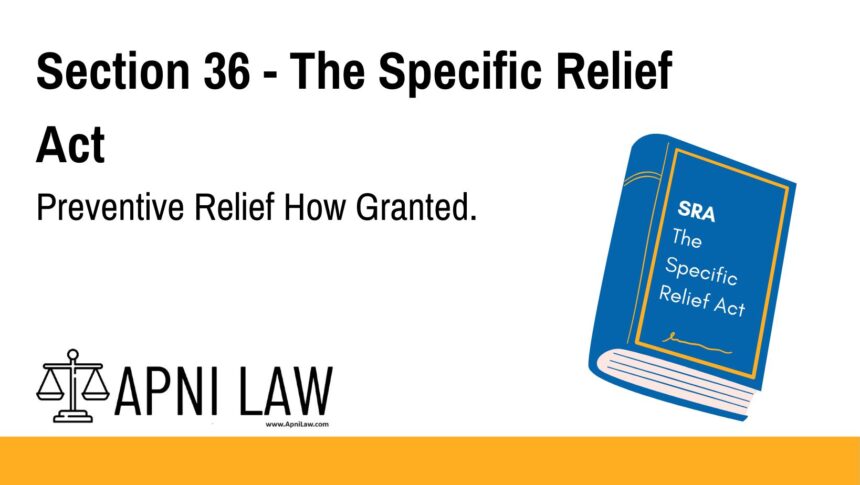Code: Section 36 – The Specific Relief Act, 1963
“Preventive relief is granted at the discretion of the court by injunction, temporary or perpetual.”
Explanation of Section 36 – Preventive Relief
Section 36 of the Specific Relief Act, 1963, provides the foundational principle for granting preventive relief. Unlike compensatory relief, which provides monetary damages, preventive relief aims to restrain a party from committing an act that would infringe upon another’s legal rights.
Under this provision, the court may, at its discretion, grant relief in the form of:
- A Temporary Injunction (interim relief during the course of litigation), or
- A Perpetual Injunction (final relief after the trial has concluded).
Section 36 acts as an introductory provision, and the procedures, grounds, and limitations related to injunctions are detailed in the subsequent sections (Sections 37 to 42).
Illustration
Example 1: Temporary Injunction to Stop Construction
A landowner finds that their neighbor has started construction that may encroach upon their property. The landowner files a civil suit and seeks a temporary injunction under Section 36 to stop the construction until the case is decided.
Example 2: Perpetual Injunction to Prevent Trademark Infringement
A company discovers that another business is using a deceptively similar logo, leading to customer confusion. The court, after hearing the case, grants a perpetual injunction restraining the infringing party from using the mark again.
Common Questions and Answers on Section 36 – Specific Relief Act
1. What is preventive relief under Section 36?
Preventive relief is relief granted to stop a person from doing something that may violate the legal rights of another. It is granted through injunctions—either temporary or perpetual.
2. What types of injunctions are available under this section?
Under Section 36, the court may issue:
- Temporary injunctions under the Civil Procedure Code (Order 39, Rules 1 and 2)
- Perpetual injunctions under the Specific Relief Act (Sections 38 to 42)
3. Is the grant of an injunction automatic?
No. The court grants injunctions at its discretion based on several factors:
- Whether the applicant has a prima facie case
- Whether there is a risk of irreparable harm
- Whether the balance of convenience favors the applicant
4. What follows Section 36 in the Act?
Sections 37 to 42 of the Specific Relief Act elaborate on:
- The different types of injunctions
- The grounds and conditions for granting them
- Exceptions and limitations
5. Can orders related to injunctions be appealed?
Yes. Orders granting or denying injunctions are appealable under the Civil Procedure Code or applicable High Court rules.
Conclusion
Section 36 of the Specific Relief Act lays the foundation for preventive relief through injunctions. Whether to prevent ongoing harm or preserve rights during litigation, injunctions play a critical role in civil proceedings. For a deeper understanding of how these remedies are applied, reference to Sections 37 to 42 is essential.
For expert legal insights, visit ApniLaw








